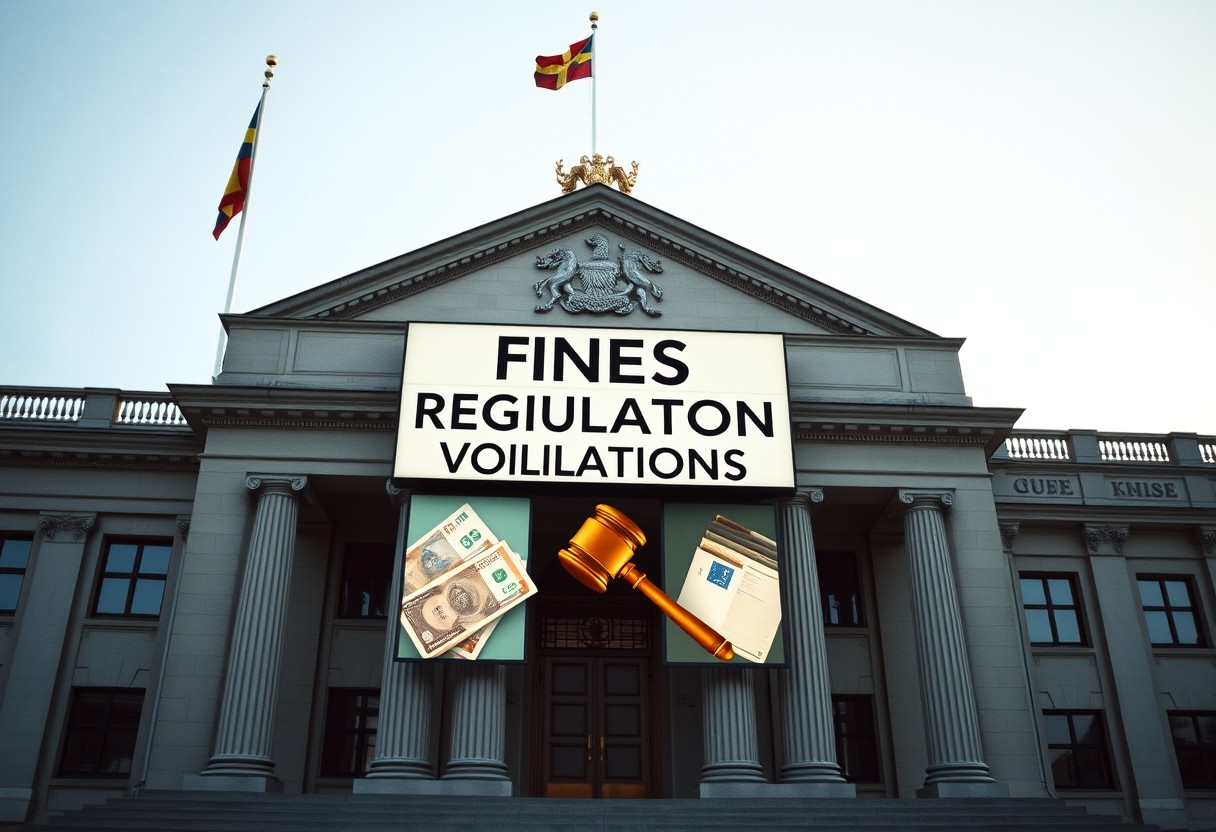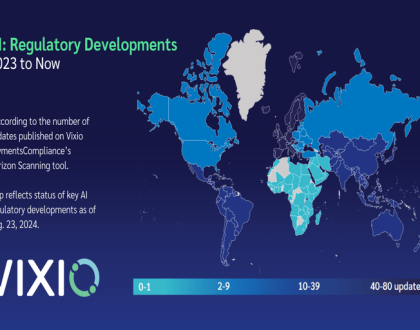Understanding Sweden’s Regulatory Fines

Many businesses operating in Sweden are often surprised by the severity of the fines imposed for regulatory violations. The Swedish government has established a robust framework designed to ensure compliance across various sectors, resulting in significant financial repercussions for those who falter. This post probes into the intricacies of Sweden's regulatory landscape, exploring the rationale behind such stringent penalties and the implications for corporations and entrepreneurs alike. Understanding these regulations is crucial for anyone looking to thrive in the Swedish market while avoiding costly missteps.
Overview of Regulatory Framework
For businesses operating in Sweden, a comprehensive regulatory framework governs various sectors, ensuring compliance with laws and standards that protect consumers, the environment, and fair market practices. This framework not only emphasizes adherence to regulations but also establishes significant fines for infractions, reflecting the country's commitment to maintaining market integrity and social responsibility.
Legislation Governing Fines
To maintain order and accountability, Sweden has instituted a robust system of legislation that outlines specific fines associated with regulatory violations. These laws serve as a deterrent against non-compliance, ensuring that entities understand the financial repercussions of their actions and adhere to established guidelines.
Key Regulatory Bodies
Regulatory bodies in Sweden play a crucial role in enforcing compliance with laws and imposition of fines. These agencies are tasked with monitoring industry practices, conducting investigations, and ensuring that organizations align with legislative standards to mitigate risks and protect public interests.
Governing bodies such as the Swedish Consumer Agency, the Swedish Environmental Protection Agency, and the Swedish Competition Authority oversee compliance within their respective domains. Their activities include conducting audits, providing guidance, and enforcing penalties for violations, thereby ensuring that firms act ethically and responsibly within their industries. This multi-layered regulatory system fosters an environment where businesses are held accountable for their practices, promoting sustainability and consumer protection.
Types of Regulatory Violations
Assuming businesses want to thrive in Sweden, understanding the various types of regulatory violations is crucial. The government enforces strict regulations, leading to severe penalties for non-compliance. Key types of violations include:
- Environmental Violations
- Financial and Corporate Violations
- Health and Safety Violations
- Consumer Protection Violations
- Data Protection Violations
Perceiving these violations accurately can help companies avoid hefty fines.
| Type of Violation | Description |
|---|---|
| Environmental Violations | Failure to comply with environmental regulations for pollution and conservation. |
| Financial and Corporate Violations | Infringements related to financial reporting and corporate governance. |
| Health and Safety Violations | Neglecting workplace safety standards and health regulations. |
| Consumer Protection Violations | Activities that compromise consumer rights and fair trading. |
| Data Protection Violations | Failure to safeguard personal data as per GDPR guidelines. |
Environmental Violations
An environmental violation occurs when companies neglect or fail to adhere to laws protecting the environment. This may involve improper waste disposal, excessive emissions of pollutants, or non-compliance with conservation regulations. In Sweden, such violations can attract hefty fines and legal actions, emphasizing the country's commitment to sustainability.
Financial and Corporate Violations
An important aspect of regulatory compliance in Sweden relates to financial and corporate violations. These breaches encompass matters such as inaccurate financial disclosures, insider trading, and failure to comply with laws governing corporate practices.
Violations in this category can have significant repercussions for companies, including severe fines, reputational damage, and potential criminal charges against executives. The Swedish regulatory environment mandates rigorous adherence to financial reporting standards and corporate governance principles, reflecting the country's commitment to transparency and accountability in business operations.
Impacts of Stringent Fines
Now, the impacts of Sweden's stringent fines extend far beyond mere financial penalties. These regulations aim to cultivate a culture of compliance and responsibility among businesses, reinforcing the idea that regulatory violations can lead to severe consequences. From restructuring operational practices to heightened awareness of legal obligations, organizations must navigate these challenges diligently in order to thrive in Sweden's regulated environment.
Economic Consequences
For companies operating in Sweden, the economic consequences of regulatory violations can be staggering. High fines not only lead to direct financial losses but can also result in increased operational costs and diminished investor confidence. Businesses may face soaring insurance premiums and potential barriers to market entry, creating a ripple effect that can hinder growth and innovation.
Behavioral Changes in Organizations
To adapt to the high stakes of Sweden's regulatory environment, organizations are compelled to reassess their internal policies and practices. This necessity for compliance fosters a culture of diligence and ethical oversight, pushing businesses to prioritize regulatory awareness and proactively mitigate risks.
A significant outcome of these stringent fines is the transformation in organizational behavior. Companies are increasingly investing in compliance training and risk management frameworks to ensure adherence to regulations. This shift not only protects against financial penalties but also enhances overall corporate governance, builds stakeholder trust, and ultimately fosters long-term sustainability in a competitive market. By embracing a more proactive approach, organizations are better equipped to navigate complexities while bolstering their reputations in an ever-evolving regulatory landscape.
Comparison with Other Countries
Many countries have varying approaches to regulatory fines, impacting businesses and compliance culture differently. Sweden's tough penalty system often stands in stark contrast to more lenient policies elsewhere, highlighting the importance of jurisdiction in enforcing regulations. Below is a comparison of fines in selected regions:
| Country/Region | Typical Fine Range |
|---|---|
| Sweden | €1,000 – €100,000+ |
| Germany | €500 – €50,000 |
| United States | $1,000 – $10 million |
| United Kingdom | £500 – £4 million |
Fines in the European Context
Any comparative analysis reveals that while European nations maintain strict regulatory measures, Sweden often imposes higher fines than its neighbors. This is particularly evident in sectors like environmental protection and data privacy, where compliance is considered paramount.
Global Best Practices
To understand the effectiveness of regulatory frameworks, examining global best practices is imperative. Various countries have developed innovative approaches that balance enforcement and compliance, enabling businesses to thrive while adhering to the law.
A robust regulatory environment often includes a tiered fine structure based on the severity of the violation, promoting compliance among businesses. Countries, such as Australia and Canada, have demonstrated success with early intervention strategies, such as industry education and accessible reporting channels, which minimize violations and encourage transparency. By learning from these practices and adapting to local contexts, nations can refine their regulatory systems, ultimately leading to better outcomes for both businesses and society at large.
Enforcement Mechanisms
To ensure compliance with stringent regulations, Sweden employs a robust set of enforcement mechanisms. These mechanisms are designed to monitor businesses and individuals effectively, aiming to cultivate a culture of accountability and transparency across various sectors. With authorities empowered to impose significant fines, the threat of regulatory action serves as a strong deterrent against violations, reinforcing the commitment to lawful practices.
Monitoring and Compliance
Mechanisms for monitoring and compliance in Sweden involve continuous surveillance and inspections conducted by regulatory bodies. These agencies utilize a combination of technology, reporting requirements, and unannounced audits to assess adherence to laws. By maintaining rigorous oversight, Sweden ensures that organizations uphold high standards, while also providing resources to aid them in understanding their obligations.
Penalties and Appeals Process
With a focus on accountability, Sweden imposes significant penalties for regulatory violations, and the appeals process is structured to ensure fairness. Organizations found in breach can face fines that often escalate with the severity or recurrence of the offense. However, there is a transparent appeals process in place, allowing individuals and businesses to contest penalties and seek a review of decisions made by regulatory authorities. This dual mechanism maintains an environment of justice while still upholding the integrity of the regulatory framework.
To effectively navigate the penalties and appeals process, organizations should be cognizant of the specific regulatory bodies governing their industry and the clear pathways available for contesting fines. Understanding the grounds for appeal—including procedural errors or excessive penalties—can be crucial for mitigating the consequences of violations. Moreover, timely action is vital as there are strict deadlines for submitting appeals. By engaging legal counsel familiar with Swedish regulations, businesses can better prepare for potential disputes and ensure their voices are heard in the appeals process.
Recent Developments in Sweden's Regulatory Environment
All eyes are on Sweden as the nation continues to tighten its regulatory framework, significantly impacting businesses. The Swedish government is focusing on enhancing transparency and accountability, leading to more rigorous oversight across various sectors. This evolving landscape of regulations means that companies must remain vigilant and well-informed to avoid costly violations and hefty fines.
New Legislation and Amendments
Recent updates include the introduction of stricter compliance guidelines, particularly in financial and environmental sectors. These changes emphasize the need for thorough reporting and proactive risk management, fostering a culture of adherence to regulations. Companies are urged to reassess their compliance strategies to align with these latest legal requirements.
Trends in Enforcement Actions
To combat regulatory breaches, there has been a noticeable uptick in enforcement actions by Swedish authorities. This trend signals a commitment to maintaining high standards and serves as a warning to organizations that non-compliance will not be tolerated.
The increased enforcement is characterized by more frequent audits and stricter penalties for violations, reinforcing the importance of adherence to regulations. Companies facing scrutiny are finding themselves subjected to higher fines and more comprehensive investigations. This proactive stance has led organizations to prioritize compliance efforts, considering it not just a legal obligation but an imperative component of their corporate strategy to mitigate risks and protect their reputation.
Summing up
Taking this into account, Sweden's stringent fines for regulatory violations serve as a robust deterrent against non-compliance, ensuring that companies adhere to environmental, labor, and consumer protection laws. The high monetary penalties reflect the nation's commitment to upholding strict regulatory standards, promoting accountability, and safeguarding the welfare of its citizens. Consequently, businesses operating in Sweden must prioritize compliance to avoid these substantial financial repercussions, thereby fostering a culture of responsibility and ethical conduct in the corporate landscape.
FAQs
What types of regulatory violations are most common in Sweden?
In Sweden, common regulatory violations include environmental violations (such as improper waste disposal), financial and corporate violations (like inaccurate financial disclosures), health and safety violations (neglecting workplace safety standards), consumer protection violations (compromising consumer rights), and data protection violations (failure to adhere to GDPR guidelines).
How severe are the fines for regulatory violations in Sweden?
Fines in Sweden can range from €1,000 to over €100,000, depending on the severity of the violation. For more severe or recurring violations, the penalties can be significantly higher, reflecting the country's strict enforcement of regulatory standards.
What are the key regulatory bodies overseeing compliance in Sweden?
Key regulatory bodies in Sweden include the Swedish Consumer Agency, the Swedish Environmental Protection Agency, and the Swedish Competition Authority. These agencies are responsible for monitoring industry practices, conducting audits, and enforcing penalties for regulatory violations.
How does Sweden's approach to regulatory fines compare to other countries?
Sweden typically imposes higher fines compared to some other countries. For instance, fines in Sweden can be significantly larger than those in Germany, the UK, and other European nations, and are often more stringent compared to jurisdictions like the United States and Australia.
What should businesses do to avoid hefty fines in Sweden?
Businesses should prioritize compliance by understanding and adhering to Swedish regulations, investing in compliance training, and implementing robust risk management frameworks. Regular audits, proactive risk assessments, and staying informed about regulatory changes are also essential for avoiding costly violations.
Recommended Posts

Sportingtech Boosts Security with Continent 8
October 4, 2024

Malta’s AML Measures in Online Gambling
October 4, 2024

AI Regulation in Payments and Gambling
October 2, 2024




